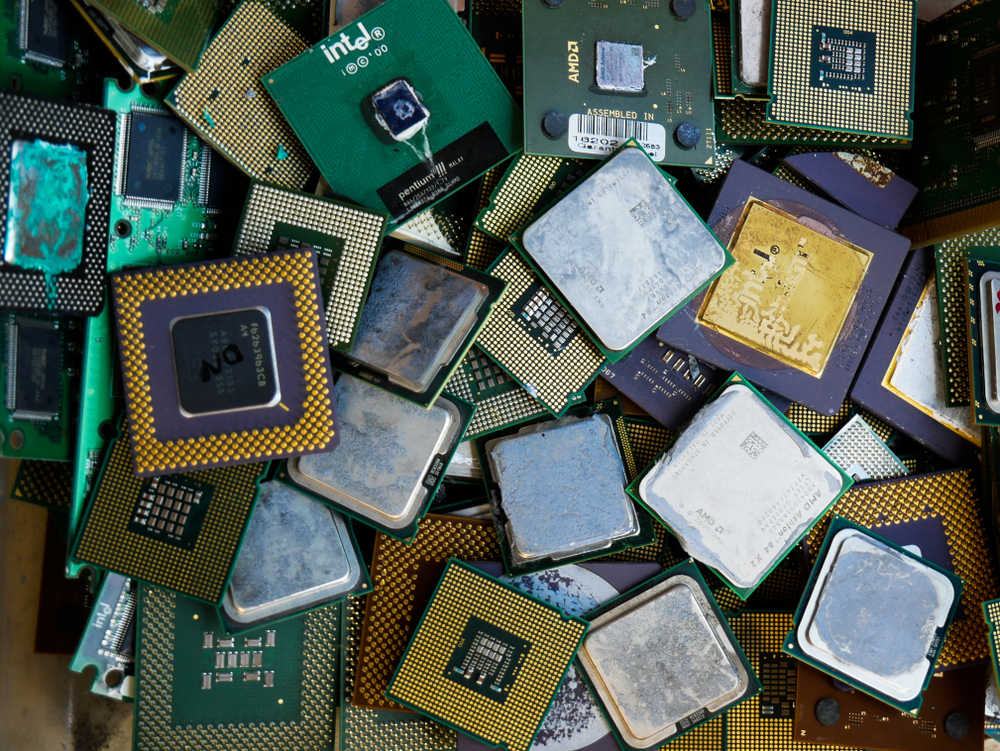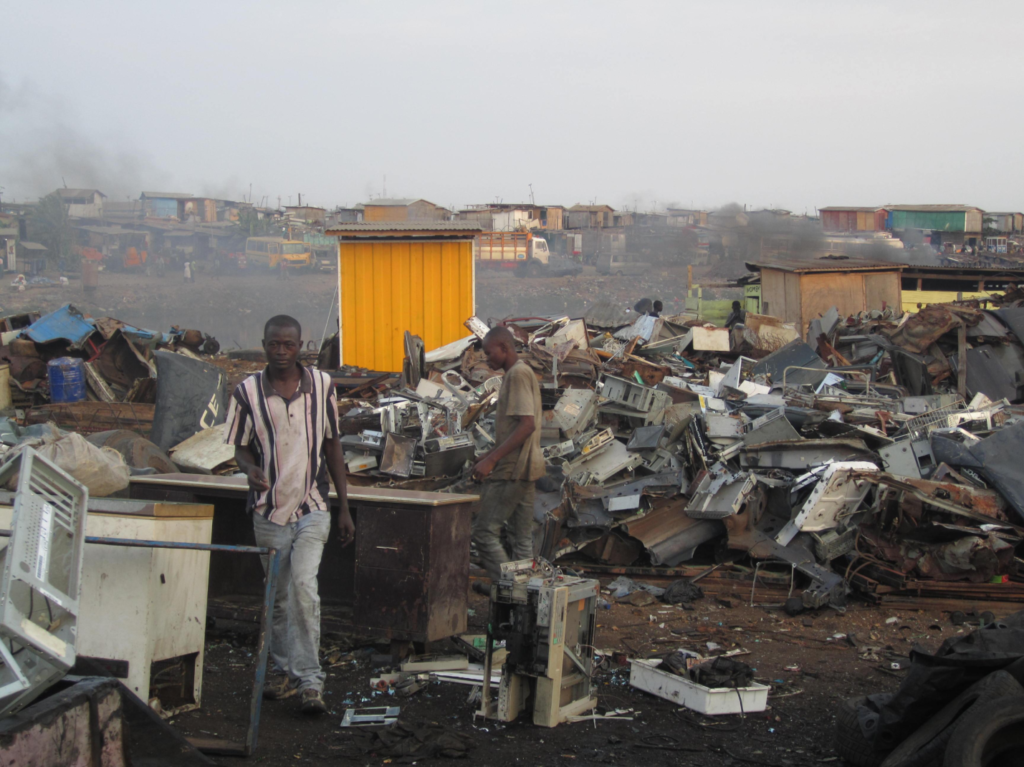Semiconductor Chips Graveyards: Where “Innovation” Goes to Die

Dumped chips. Take a good look at them. Don’t look so pretty after they’ve been used, abused and left to die as waste.
Semiconductor chips have grown to become quintessential to technology – and everything it touches. From the smartphone you’re holding to the e-car you’re driving.
For nations, it’s about economic security. For the military, it’s become a matter of national security. Of course, for business it’s about profits.
The Semiconductor industry is by its very nature, a dynamic global collective. Decentralization best describes its corporate structure – Headquarters and all operations are not necessarily in the same building or location.
Take as an example, Skyworks Solutions, Inc. The American semiconductor company is headquartered in Irvine, California with locations in the Americas, Europe, and Asia (including China and Taiwan).
Are Skyworks “manufacturing facilities” doing business in the countries that are part of the MCA deal (Mexico, Canada, and US)? Is the company engaged in health hazardous materials waste management resulting from the semiconductor fabrication processing and/or transportation of materials?
Recall, US companies in the automobile and meat industry doing business in Mexico have reportedly engaged in recklessly exposing workers to contaminates and dangerous substances. Do Skyworks management systems include risk management that adheres to control mechanisms in place for the protection of workers and safety to the environment?
Silicon, Chip Special Element
Silicon has proved to be a priceless element in the making of chips. “Despite advances in semiconductor materials, silicon remains the most common base for wafers. This is due to its ability to act as conductor and insulator, depending on heat and energy exposure, and to the simple fact that it’s one of the most abundant elements on earth.”
Important to note that while Silicon is easily recycled, “almost 70 percent of electronic products wind up as unrecycled trash.” But chances are Western consumers won’t see it. Tech executives have made sure of that thanks to cross border or overseas operations.
Like the smartphone and e-car, the Personal Computer too had its challenges in recycling. In 2000, according to the International Symposium on Advanced Waste and Emission Management, “Circuit Boards – Require considerable processing including grinding and separation processes… It is unlikely that PC and electronic recycling operations can be made profitable without a subsidy or “tipping fee.”
SiliCON Valley, entrepreneurs and governments around the world will tell you as a simple matter of fact that progress comes at a high cost. Capitalists or Communists, rationalization continues to be –‘ends justify the means.’
In a recent interview with Stephen Sackur on HARDtalk, David Friedberg seems to be aware of the existence in our environment of chemically engineered products and carcinogens. Necessary evil?
Friedberg appears to take the view that progress is “for the greater good.” Right, for the good of those who hold the greater power. Problem is, David, it comes at the expense of the rest.
Sure, it worked well for you and the Germans. Got a bad rap for your association with MONSANTO? The Climate Corporation sell out to MONSANTO became a buy out just three years later by Germany’s BAYER.
Science and Technological investments benefiting humankind in time? David concludes, “from microscopic to space, time will tell…”
Problem is, David, humans and animals live in between these two spaces. As to your business deal with MONSANTO, was it really a matter of “cost-benefit” or a $1 billion “Return on Investment?”
I remind you, with all the money in the world, you can’t buy more time.
SiliCON men, as I’ve noted before: Softmen, do the world a favor, just take your money and run. But mark our words, no amount of power or philanthropy will reward you immortality, as Paul with his soft Micro company and Steve with his “little apple” discovered.
Here’s the telling reality. Will your end justify the means?
Picture it. After an eight or twelve hour workday, Child Laborer and Executive quench their thirst. One takes a drink from a plastic water bottle found in a yard of chip waste, and the other takes a sip of Martini from a crystal glass from a high-rise flat overlooking a city of lights, sounds and dust.
Progress, ain’t it a bitch?
Chips Graveyards: Western Overseas Dump Yards

Visiting electronicsandyou.com you’ll find “Semiconductor materials include – Silicon, antimony, arsenic, boron, carbon, germanium, gallium arsenide, selenium, silicon carbide, sulfur, tellurium, oxides of most metals.”
But few have given it a second thought as to the industry’s use of materials’ negative effect on the environment or challenge of the chip.
“Recycling semiconductor materials not only costs money—the process of reclaiming semiconductor materials from e-waste also generates its own waste, much of it toxic. Complicating matters further, recycling e-waste is often outsourced to developing countries, where local recycling firms often use child labor to sort recyclables, manually recycle products, and burn unusable parts.”
Liken to ingredients for a food recipe, an array of Technology-Critical Elements (TCEs) go into the making of semiconductors. From design to fabrication to finished product to waste management, the process is lengthy and costly.
Chip making is time consuming (few weeks to three or more months). And liken to biological laboratories, these so called fab labs need to adhere to specific environmental standards that require sterilization.
In any case, the TCEs “end-of-life continues to prove difficult, as does the need to produce semiconductor devices using more sustainable processes to reduce the emissions of toxic pollutants during the manufacturing process.”
Upsurge in consumerism accelerated by IoT and AI created a dependency on chips putting humans in a ‘catch 22.’ TCEs have taken their rightful dirty place alongside fossil fuels and chemical companies sickening workers and children.
Notes the“World Health Organization, children working in such conditions are exposed to lead, lithium, cadmium, mercury, and chromium…child labor is used in electronics recycling at a global level… 35,000 to 45,000 children work as waste pickers and dismantlers in Delhi, India, alone.”
India, bet you thought outsourcing of services meant only taking calls. US and Europe will tell you, keep answering and picking up our shit. “The Customer is Always Right.”
Corporate Shareholders continue to trump environmental and health conscious stakeholders. My green friends, it’s time to rethink strategies and tactics.

заказать акпп https://www.akpp-store.ru.
интернет в калининграде https://domashnij-internet-kaliningrad.ru/.
каркасный дом под ключ недорого в москве http://www.karkasnye-doma-pod-klyuch-moskva.ru/.
Интегральная йога http://www.kundalini-yoga.su.